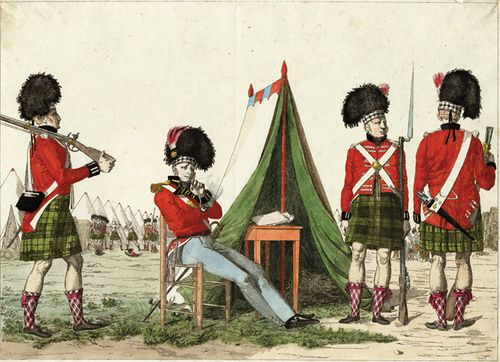Annotation:Royal Highlanders Welcome from Waterloo (The): Difference between revisions
No edit summary |
No edit summary |
||
| Line 10: | Line 10: | ||
<div style="text-align: justify; direction: ltr; margin-bottom: 90px; margin-left: 70px; margin-right: 120px;"> | <div style="text-align: justify; direction: ltr; margin-bottom: 90px; margin-left: 70px; margin-right: 120px;"> | ||
<br> | <br> | ||
'''ROYAL HIGHLANDERS WELCOME FROM WATERLOO, THE.''' Scottish, March (4/4 time, “Slowly”). G Major. Standard tuning (fiddle). AB. “Communicated by Mr. McLeod of Rasa” (Gow, 1817), perhaps referring to The Laird of Raasay, who, in Nathaniel Gow's (1761–1831) time was the 12th, James MacLeod (1761–1724) who lived contemporaneously. The battle of Waterloo was fought on June 18th, 1815, some two years prior to the printing of Gow's '''4th Repository''', and, in the context of the times, the heroic event was still quite topical (see also the Gow’s “[[Lamentation for the Fallen Heroes of Waterloo]]”). Gow included two other tunes in the same collection that refer to the battle, “[[Lamentation for the Fallen Heroes of Waterloo]]” and “[[Highland Brigade at Waterloo (The)]].” The Royal Highlanders were the 42nd Regiment of Foot, otherwise famously known as The Black Watch. | '''ROYAL HIGHLANDERS WELCOME FROM WATERLOO, THE.''' Scottish, March (4/4 time, “Slowly”). G Major. Standard tuning (fiddle). AB. “Communicated by Mr. McLeod of Rasa” (Gow, 1817), perhaps referring to The Laird of Raasay, who, in Nathaniel Gow's (1761–1831) time was the 12th, James MacLeod (1761–1724) who lived contemporaneously. The battle of Waterloo was fought on June 18th, 1815, some two years prior to the printing of Gow's '''4th Repository''', and, in the context of the times, the heroic event was still quite topical (see also the Gow’s “[[Lamentation for the Fallen Heroes of Waterloo]]”). Gow included two other tunes in the same collection that refer to the battle, “[[Lamentation for the Fallen Heroes of Waterloo]]” and “[[Highland Brigade at Waterloo (The)]].” [[File:42nd.jpg|500px|thumb|right|]] | ||
<br> | |||
<br> | |||
The Royal Highlanders were the 42nd Regiment of Foot, otherwise famously known as The Black Watch. | |||
<br> | <br> | ||
</div> | </div> | ||
Revision as of 02:43, 11 April 2018
X:1 % T:Royal Highlanders Welcome from Waterloo, The M:C L:1/8 R:March S:Gow – 4th Repository (1817) Z:AK/Fiddler’s Companion Q:"Slowly" K:G B|d2 d>B ~d>e d>B|e<e e>d e3f|g>edB A>GAB|E<E E>D G3B| d2 d>B ~d>ed>B|e<e e>^d e3f|g>edB A>GAB|E<E E>D G3|| d|[G,2D2B2g2] gb B>ABG|EAA>B A(afa)|(g/f/)e/d/ Bg dB|AG|(F/G/A) D>c BGGd| [G,2D2B2g2] gb B>A BG|EAA>B A(afa)|(g/f/e/d/) B>d (e/d/c/B/ c/B/A/G/)|((6F/G/A/G/F/E/ D>)c BGG||

The Royal Highlanders were the 42nd Regiment of Foot, otherwise famously known as The Black Watch.
